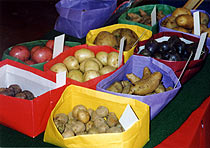Berkeleyan
Like water for chocalatyl
Through October, Botanical Garden visitors can see — and taste — traditional preparations of potatoes, acorns, soap root, and other foods of the Americas
![]()
30 September 2004
 Only an example of the amazing variations on the potato — all from the beginnings in the Andes. |
The vibrant textures and colors of the fall harvest in the Americas will be on display Oct. 7 through 27 at the UC Botanical Garden. Located in the garden’s conference center, the exhibit showcases produce from ancient Indian cultures — from the well-known corn, tomatoes, potatoes, and chocolate to the less familiar amaranth, quinoa, and ocha. (Meanwhile — in the garden’s Crops of the World Garden, Tropical House, and Mexico/ Central American and South American collections — some of these food crops appear live.)
For the first time this year, the garden has organized a series of events designed to let visitors see how these food products were prepared by native peoples — and taste the results. “Our culture has adapted potatoes and developed its own recipes, but we don’t often get to see how they’re traditionally prepared,” notes program coordinator Perry Hall. So the garden is bringing in a Bolivian cook to share traditional preparations of this pantry staple. Likewise, garden visitors can learn how California natives prepared soap root bulbs (as demonstrated by two Ohlone cooks); test tamales and chocolate preparations used by Aztec and Mayan peoples before the arrival of the Spanish; and take a guided tour of the garden’s Mayan and Aztec medicinal plants.
The Foods of the Americas exhibit is free with admission to the garden (open between 9 a.m. and 5 p.m.). Associated programs include the following:
• Red Tomatoes, Hot Peppers, and Sweet Vanilla, Saturday, Oct. 9, 2-5 p.m.
What makes chiles hot? What makes ripe tomatoes red and tasty? Why shouldn’t we eat green potatoes? Margareta Sequin, chemistry professor at San Francisco State University, will lead visitors in discovering the wealth of exciting food plants of the Americas that native peoples used for food and medicine. Visitors will learn what makes some food plants sweet, and others sour or bitter and see the colorful pigments that make many food plants inviting to humans and animals alike. A slide lecture introduction will be followed by a walk through the Crops of the World Garden. The cost for admission is $12 for the public, $8 for garden members.
• Foods of the Andes Potato Festival, Saturday, Oct. 16, noon-1:30 p.m.
This event is dedicated to the food and music of the Andes, the birthplace of the potato. Learn how potatoes are traditionally prepared from cooks at Pena Pacha Mama, a Bolivian restaurant in San Francisco. Listen to the traditional Bolivian music of Sukay as you taste the dishes prepared. Children’s activities include potato stamp art, making pan pipes, and listening to stories about potatoes. The cost is $23 for the public, $18 for members, and $10 for children, who must be accompanied by an adult.
• Mayan and Aztec Medicinal Plants Tour, Sunday, Oct. 17, 11 a.m.-12:30 p.m.
Explore the garden’s collection of Mayan and Aztec medicinal plants, in the renowned Mexican and Central American Area, with horticulturist Eric Schulz. See plants such as Mal Hombre, the Monkey Hand Tree, and Tree Dahlias, and learn which ailments they were used to cure. The cost is $12 for the public, $8 for members.
• Día de los Muertos Celebration, Saturday, Oct. 23, 12:30-2 p.m.
Discover more about the rich tradition and delicious foods of Mexico’s Día de los Muertos celebration, and see an elaborate altar on loan from Folk Art International. Learn from Mi Tierra Foods how to make tamales — and then taste them. Hear the history of the Mayan and Aztec uses of chocolate from Scharffen Berger Chocolate’s Brad Kintzer, and taste hot chocalatyl as made by the Aztecs. Kids can hear stories about the holiday and make paper marigolds and papel picado flags to take home. The cost is $23 for the public, $18 for members, and $10 for children, who must be accompanied by an adult.

